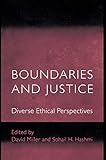Boundaries and Justice : Diverse Ethical Perspectives / ed. by David Lee Miller, Sohail H. Hashmi.
Material type: TextSeries: Ethikon Series in Comparative Ethics ; 4Publisher: Princeton, NJ : Princeton University Press, [2021]Copyright date: ©2002Description: 1 online resource (384 p.)Content type:
TextSeries: Ethikon Series in Comparative Ethics ; 4Publisher: Princeton, NJ : Princeton University Press, [2021]Copyright date: ©2002Description: 1 online resource (384 p.)Content type: - 9780691230931
- PHILOSOPHY / Political
- Aristotle
- Bernard of Clairvaux
- Black, Samuel
- Boutros-Ghali, Boutrous
- Buchanan, Allen
- Charlesworth, Hilary
- Dworkin, Ronald
- East Timor case
- Frontier Dispute
- Global Fund
- Grotius, Hugo
- Gutiérrez, Gustavo
- Han Yu
- Hastings, Adrian
- International Criminal Court (ICC)
- International Monetary Fund
- Island of Palmas case
- Jefferson, Thomas
- Khadduri, Majid
- King, Ambrose
- Kymlicka, Will
- Law of Return
- Lomasky, Loren
- Miller, Richard
- Nuclear Tests case
- Pachomius
- Schwartz, Benjamin
- Tillich, Paul
- Walzer, Michael
- anarchism
- appropriation rules
- authority: over bounded territory
- categorical imperative (Kant)
- class divisions
- compensation
- cosmopolitanism
- difference principle (Rawls)
- ethics: Christian
- ethnic divisions
- expropriation
- global commons concept
- individuality (Mill)
- jurisdiction, extraterritorial
- love, Christian
- physical capital
- political realism
- social contract
- socialism
- solidarity
- utilitarianism
- 172 22
- online - DeGruyter
| Item type | Current library | Call number | URL | Status | Notes | Barcode | |
|---|---|---|---|---|---|---|---|
 eBook
eBook
|
Biblioteca "Angelicum" Pont. Univ. S.Tommaso d'Aquino Nuvola online | online - DeGruyter (Browse shelf(Opens below)) | Online access | Not for loan (Accesso limitato) | Accesso per gli utenti autorizzati / Access for authorized users | (dgr)9780691230931 |
Frontmatter -- Contents -- Acknowledgments. -- Contributors -- Introduction -- One. Christian Attitudes toward Boundaries -- Two. The Value of Limited Loyalty -- Three. Toward a Liberal Theory of National Boundaries -- Four. Hard Borders, Compensation, and Classical Liberalism -- Five. Territorial Boundaries and Confucianism -- Six Boundaries of the Body and Body Politic in Early Confucian Thought -- Seven. International Law, Boundaries, and Imagination -- Eight. Territorial Sovereignty -- Nine Islamic Perspectives on Territorial Boundaries and Autonomy -- Ten. Religion and the Maintenance of Boundaries -- Eleven. Land and People -- Twelve. Contested Boundaries -- Thirteen. Territorial Boundaries -- Fourteen. Group Boundaries, Individual Barriers -- Fifteen. Boundaries, Ownership, and Autonomy -- Sixteen. In Defense of Reasonable Lines -- Seventeen. The Ethics of Boundaries -- Index
restricted access online access with authorization star
http://purl.org/coar/access_right/c_16ec
Despite the supreme political and economic significance of boundaries--and ongoing challenges to existing national boundaries--scant attention has been paid to their ethics. This volume explores how diverse ethical traditions understand the political and property rights reflected in territorial and jurisdictional boundaries. It is the first book to bring together thinkers from a range of traditions, both religious and secular, to discuss the ethics of boundaries. Each contributor represents a tradition's views on questions surrounding the use of boundaries to delimit property and political rights. What does it mean to own something? What resources should not be privately owned? What justifies the erection of political boundaries between one people and another? How ''hard'' should such boundaries be? What rights extend to minorities within a state? Should territorial boundaries coincide with social ones? Does national autonomy have an ethical basis, or is it an aspect of modern power politics? Should we aim for a more inclusive community than that afforded by modern nation-states? Cross-chapter dialogue and a substantive conclusion draw out similarities and differences among the traditions represented, traditions that include Christianity, classical liberalism, Confucianism, international law, Islam, Judaism, liberal egalitarianism, and natural law. In addition to the editors, the contributors are Nigel Biggar, Joseph Boyle, Joseph Chan, Russell Hardin, Will Kymlicka, Loren Lomasky, Robert McCorquodale, Richard B. Miller, David Novak, Sulayman Nyang, Michael Nylan, Raul C. Pangalangan, Daniel Philpott, Jeremy Rabkin, Hillel Steiner, M. Raquibuz Zaman, and Noam J. Zohar.
Mode of access: Internet via World Wide Web.
In English.
Description based on online resource; title from PDF title page (publisher's Web site, viewed 24. Aug 2021)


